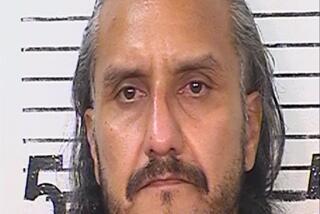Amnesty International Asks Probe of Tijuana Death
- Share via
TIJUANA — Amnesty International, the London-based world rights-monitoring organization, joined a Tijuana rights group Thursday in calling on Mexican federal and state authorities to investigate the alleged police beating of a former drug suspect who later died.
Patricia Kimble, who coordinates Amnesty’s refugee program in San Diego, said during a news conference here that Amnesty had formally requested that Mexican authorities conduct a thorough inquiry into the now-celebrated case of Ruben Oropeza Hurtado, whom rights activists and former companions here describe as an innocent victim of Mexico’s war on drugs.
“What we’re basically asking for is an immediate investigation,” said Kimble, who noted that current information about the Oropeza case indicates several “discrepancies.”
One such discrepancy, Kimble said, involves an account by the Mexican attorney general’s office denying that Oropeza was beaten and instead contending that the suspect--while crazed on drugs--injured himself by repeatedly beating himself against a police vehicle.
“That’s very hard for us to believe,” said Kimble, who noted that many of the injuries suffered were internal and unlikely to be self-administered. “How could somebody hit himself like that?”
Oropeza, 40, died in a public clinic here Oct. 1, more than six months after he was arrested by Mexican Federal Judicial Police in Tijuana and charged with possession of marijuana and heroin. Before his death, Oropeza denied the drug charges and contended that he had been tortured and forced to sign incriminating documents.
Medical evidence and statements by companions corroborate Oropeza’s account of the beating, rights activists contend.
According to an Amnesty International medical report, physicians who examined Oropeza declared that he developed a hernia in his diaphragm “as a result of blows to the abdomen.” He also suffered extensive intestinal damage and a collapsed left lung, the Amnesty report stated. The intestinal injuries and other internal damage figured in his death, according to his death certificate, which also lists malnutrition as a cause of death.
The dead man’s former common-law wife, Patricia Elizondo, who is also facing federal drug charges, has said she witnessed federal police agents beating Oropeza, according to the Binational Center of Human Rights, a Tijuana group. Two other prison inmates say they saw a badly wounded Oropeza in police cells shortly after the beatings, the rights group says.
Before he was hospitalized, Oropeza was one of about 50 hunger strikers at the Baja California state penitentiary in Tijuana who refused to eat solid food in protest of beatings and other abuses by Mexican federal police.
The Oropeza case and the questions surrounding his treatment while in custody have been widely reported in the Mexican press, adding ammunition to widespread allegations that drug-fighting federal police resorted to beatings, torture, coerced confessions and other illegal acts in an effort to show progress in their anti-drug crusade.
On a national level, charges of abuse by anti-drug police have challenged the moral authority of President Carlos Salinas de Gortari, who has pledged to crush corruption and uphold human rights.
Just last week, President Salinas dismissed the nation’s top drug prosecutor, a move that many observers saw as an effort to distance the president from the abuses attributed to federal anti-narcotics police. The president had earlier disbanded a much-criticized nationwide network of federal drug checkpoints and created a National Commission on Human Rights to investigate all allegations of official abuse and torture.
Amnesty International’s request for an investigation into the Oropeza affair is directed at that National Commission.
Meantime, the Tijuana-based Binational Center of Human Rights requested that federal and state authorities launch inquiries into the Oropeza case, said Victoor Clark Alfaro, who heads the Tijuana group.
“We have reason to believe that Ruben Oropeza was tortured, and that he died of injuries related to that torture,” Clark said.
More to Read
Sign up for Essential California
The most important California stories and recommendations in your inbox every morning.
You may occasionally receive promotional content from the Los Angeles Times.













